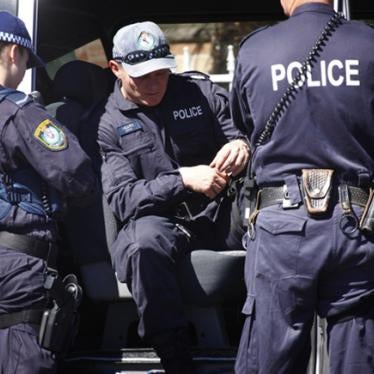(Sydney) – Australia’s vague and overbroad new counterterrorism laws infringe on the basic rights of all Australians, Human Rights Watch said today in its World Report 2015. Australian government actions placed refugees and asylum seekers at greater risk than ever of being returned to a country where they face repression or torture.
“Draconian counterterrorism laws undermining free speech are causing incalculable damage to Australia’s international standing as a rights-respecting country,” said Elaine Pearson, Australia director at Human Rights Watch. “Harsh refugee policies may score domestic political points, but the human toll is unacceptable.”
In the 656-page world report, its 25th edition, Human Rights Watch reviews human rights practices in more than 90 countries. In his introductory essay, Executive Director Kenneth Roth urges governments to recognize that human rights offer an effective moral guide in turbulent times, and that violating rights can spark or aggravate serious security challenges. The short-term gains of undermining core values of freedom and non-discrimination are rarely worth the long-term price.
In 2014, the government of Prime Minister Tony Abbott rushed through several new counterterrorism offenses imposing criminal penalties for “advocating terrorism” and traveling to “declared areas” abroad, as well as making unauthorized disclosures of information related to “special intelligence operations.”
“Australia’s new counterterrorism laws mean journalists, whistleblowers, and activists will risk prison for certain disclosures – even if it’s in the public interest,” Pearson said. “The government rammed these measures through parliament despite their having lasting consequences on Australians’ civil liberties.”
The Abbott government continued its policy of transferring all asylum seekers who arrive by boat to Nauru and Papua New Guinea despite concerns about prolonged refugee status determination procedures, violence and intimidation by local communities, and mistreatment and poor conditions in detention. In September, the government finalized an agreement with Cambodia whereby Cambodia will accept refugees from Nauru in exchange for bilateral aid, despite the Cambodian government’s lack of capacity to integrate refugees and ensure respect for their rights.
Australian authorities violated international law by handing over at least two boatloads of Sri Lankan asylum seekers to the Sri Lankan navy after cursory interviews at sea, possibly putting them at risk of torture or persecution. Human Rights Watch and others have documented cases of torture and rape of ethnic Tamil detainees previously forcibly returned to Sri Lanka, including some from Australia.
In international affairs, Australia used its United Nations Security Council seat effectively to promote human rights in Syria, North Korea, Central African Republic, and elsewhere. Australia is bidding for a seat at the UN Human Rights Council in 2018. However, in its bilateral relationships, the government maintained a position of rarely speaking out publicly on abuses. Besides trade and security, the Australian government’s foreign policy has focused on deterring asylum seekers from coming to Australia at the exclusion of other rights issues.
“The government has muted its criticism of abusive governments in Sri Lanka and Cambodia in recent years in apparent hopes of winning their support for its discredited refugee policies,” Pearson said. “Australia’s aspirations for a more powerful role in world affairs will get nowhere until it acts on human rights concerns both at home and abroad.”







